The standards drafting team revising the requirements for determining and communicating system operating limits (SOLs) told the Standards Committee on Wednesday it may have broken an impasse that has slowed progress and expects to post the standard for industry comment by February 2020 (Project 2015-09: FAC-010, FAC-011, FAC-014).
SDT Chair Vic Howell said most sticking points have been resolved, but the team is still considering how to deal with the burden placed on industry by the logging and communication requirements relating to SOL exceedance. The team has been working with FERC and industry operators over the last nine months to revise the relevant language and reach consensus with the affected stakeholders.
“We’ve come up with something this morning that we think will address the FERC concerns, as well as those commenters who have been very concerned about the logging and communications administrative burden,” Howell said, without elaborating on the proposed solution.
In response to questions about the collection of industry data to support the SDT’s work, Howell acknowledged that the entities surveyed have been reluctant to share relevant information. As a result, the team created measures to ensure anonymity for the industry participants. In addition, the organizations used a variety of methods to collect and store data, which created challenges with synthesizing information in a useful format.
Some committee members questioned whether the team should make sure it has enough data from all industry players before it posts the proposals for comment next year. However, others noted that this could result in even more delays.
“People would have to put things in place today to start collecting winter [data], and then you’d have to wait for summer, and then you’d have to select a couple of off-peak scenarios. So that really would drag out the process another year,” said Howard Gugel, NERC director of engineering and standards. “Hopefully the drafting team has come up with a solution that … addresses the problem, without having to burden industry with a tremendous amount of data collection and data reporting.”
Consultants Removed from SDT Nominee List
Following a proposal to nominate 10 members to the PRC-005-6 SAR drafting team, Dominion Resources Services’ Sean Bodkin asked that two of the nominees — who, like the others, were not identified by name during the discussion — be removed on the grounds that they were consultants.
“When I go back and look at the policy from last year for including consultants on drafting teams, they’re supposed to add some particular technical expertise or something that the team is lacking,” Bodkin said. “In this case I don’t see … any specific technical expertise that they are adding that the other members of the team do not have.”
NERC Manager of Standards Development Soo Jin Kim said that the nominating team had considered this objection but concluded the two candidates’ backgrounds in generation would provide the team with valuable insights. In addition, one had previous drafting team experience.
Kim said that if the full slate of nominees was not approved, another round of solicitation would likely be needed to fill the two gaps on the team. Committee members saw this as an acceptable way to fulfill the requirements regarding drafting team membership.
“If NERC thinks it can achieve its needs by having an additional solicitation for nominees, that would definitely be my preferred option, rather than adding the two consultants,” said Sean Cavote of Public Service Enterprise Group.
Bodkin’s motion passed unanimously, and all nominees except the two consultants, including the chair and vice chair, were approved.
Impact of New NERC Committee
Gugel updated the committee on the expected results of the NERC Board of Trustees’ decision to merge the Operating, Planning and Critical Infrastructure Protection Committees (See Board OKs Committees Merger.) The merger would create a new body, tentatively called the Reliability and Security Technical Committee (RSTC).
Nominations for the new committee are currently being solicited. The RSTC will have 34 voting members: two each from sectors 1-10 and 12, 10 at-large members, and a chair and vice chair. The existing committees will conduct their scheduled meetings in December and March, with the new body taking over their functions by June.
“Probably the largest impact that has for us is that … the Standards Committee would be going to the RSTC for legal and technical support for SARs, as opposed to … the OC, PC or CIPC [as in the past],” Gugel said. “The standards [creation] process will [also] probably need to be revised to incorporate whatever methods the RSTC would like to set up.”
— Holden Mann







